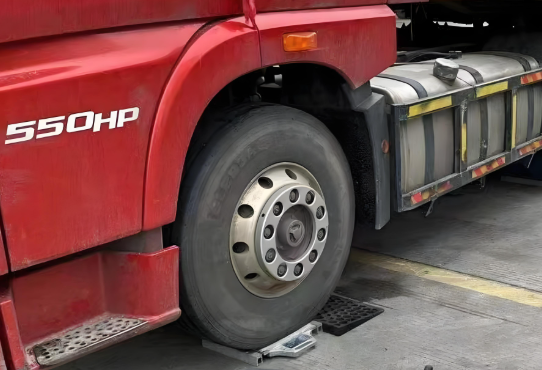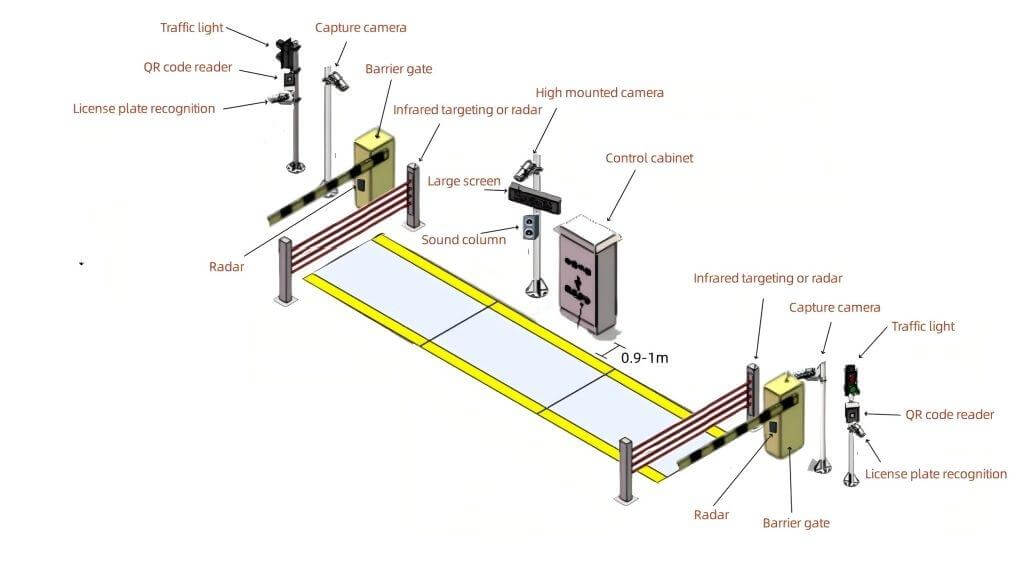What is a Weigh Station for Trucks? Why Does It Matter?
When driving a truck down the highway, have you ever noticed the sign that says, “Weigh Station Ahead, Keep Right”? But what is a weigh station for trucks?
Weill, for truck drivers, weigh stations are a familiar part of their routine. But what makes them so important? How do they impact your driving safety and operational efficiency? Keep reading, and you’ll find all the answers in this article.
Part 1. What is a Weigh Station?
Weigh station is a specialized inspection facility designed for freight vehicles equipped with truck scales to measure the total and axle weight of trucks, ensuring compliance with prescribed weight limits. These stations play a crucial role in maintaining road safety, protecting public infrastructure, and promoting regulatory compliance within the freight industry.

Part 2. What are the Purposes of Truck Weigh Stations?
Truck weigh stations serve several important purposes, primarily focusing on safety, compliance, and infrastructure protection. Here are the key purposes:
Ensuring Compliance with Weight Regulations
Weigh stations ensure that trucks are not exceeding the legal weight limits set by road authorities. Overloaded trucks can damage roads, bridges, and other infrastructure, so compliance with weight regulations helps prevent costly repairs and maintenance.
Promoting Road Safety
By ensuring that trucks are within the prescribed weight limits, weigh stations help prevent accidents caused by overloaded vehicles, which can affect braking, stability, and overall vehicle handling. This not only protects the truck driver but also enhances the safety of other road users.
Protecting Infrastructure
Overloaded trucks can cause significant wear and tear on roads, bridges, and tunnels. Weigh stations help protect public infrastructure by preventing trucks from carrying excess weight that could lead to premature deterioration.

Ensuring Personal Safety
Weigh stations help reduce the risk of accidents and injuries by ensuring trucks are safely loaded. Overloaded trucks can pose a danger to both the driver and others on the road, making weigh stations crucial for preventing potentially fatal incidents.
Enforcing Commercial Vehicle Regulations
Weigh stations are an essential tool for enforcing various regulations governing commercial vehicles, such as load limits, axle weights, and other safety requirements.
Part 3. How Do Weigh Station Work?
Weigh stations are facilities where vehicles, especially trucks, are weighed to ensure compliance with weight regulations. They play a critical role in monitoring road safety and maintaining infrastructure. Here’s how they work:
Vehicle Entry: Trucks or other vehicles approaching a weigh station typically drive through an entry lane. In some cases, there may be a pre-screening system using sensors or cameras to determine if the vehicle needs to stop for a full inspection.

Trucks and Weigh Station Procedures:
Step 1. Static Weighing
The vehicle stops on a platform scale, and its weight is recorded. The scale measures the weight of the entire vehicle, including the load it’s carrying.
Step 2. Dynamic Weighing
In some cases, weigh stations are equipped with in-motion scales. Trucks can drive over these scales, allowing for the vehicle’s weight to be measured while it is moving. This process saves time compared to static weighing.
Step 3. Data Analysis
The data collected from the scale is analyzed using automated systems to compare the weight against legal limits. This helps determine if a vehicle is overloaded, which can cause damage to roads and bridges.
Step 4. Compliance Check
If the vehicle exceeds the weight limits, the driver is typically instructed to pull over for further inspection. If the vehicle is within the limits, the driver is allowed to proceed.
Step 5. Additional Inspections
If a vehicle is overweight, authorities may require the driver to offload part of the cargo or face fines. Sometimes, the vehicle’s cargo is inspected for safety or to ensure that it meets other regulations (e.g., hazardous materials).
Step 6. Exit
Once the weighing and checks are complete, the vehicle is free to leave the weigh station, either continuing on its route or stopping for additional inspections if necessary.
Main Equipment in Weigh Station
- Static Weighbridge: Weighing is done when the vehicle is completely stopped, providing precise weight measurements.
- Dynamic Weighbridge: Allows weighing as the vehicle passes over the scale at low speed, improving efficiency, suitable for high traffic areas.
- Portable Axle Weighing Scale: Suitable for temporary deployment or flexible weighing scenarios, typically used for axle weight checks.
- Axle Load Scale: Used to measure the weight of individual axles to ensure each axle is within the weight limit.

Part 4. Who Has to Stop at a Weigh Station?
In most cases, commercial vehicles are required to stop at weigh stations. These vehicles include:
Trucks: Large freight trucks, including tractor-trailers and cargo trucks, are the primary vehicles that must stop at weigh stations to ensure they are within legal weight limits.
Buses: Some buses, particularly those carrying passengers, may also need to stop, depending on local regulations.
Hazardous Material Vehicles: Trucks or vehicles transporting hazardous materials often have to stop for additional inspections, including weight checks, to ensure safety.
Oversized Vehicles: Vehicles that exceed standard size or weight limits (e.g., construction equipment or wide-load transports) must stop for inspection at weigh stations to ensure compliance with load restrictions.
Commercial Delivery Vehicles: In some cases, delivery vehicles that operate on a commercial basis (e.g., large delivery vans) might be required to stop at weigh stations, especially if they are carrying heavy loads.

Exemptions:
Passenger vehicles, such as private cars, motorcycles, and light trucks, generally do not need to stop at weigh stations unless specified by the state or local laws.
Some jurisdictions may have automatic or bypass systems for vehicles with electronic tags that can be screened without stopping.
The specific requirements can vary by region, and trucks are typically subject to these checks to ensure compliance with weight regulations designed to protect infrastructure and ensure road safety.
Part 5. What Happens if You Don’t Stop at a Weigh Station?
In general, when a weigh station is closed, out of service, or when truck drivers receive a bypass green light, they can “skip” the weigh station. However, if a driver fails to stop at the weigh station as required, they may face serious consequences such as fines, traffic violations tickets, or even vehicle detention.
Overweight vehicles may face further inspections, causing longer delays and additional costs. Furthermore, repeated violations could damage the company’s reputation, affect relationships with clients and regulatory authorities, and even result in loss of operating licenses. To avoid these risks, it is crucial to comply with weigh station regulations.
Final Words
Weigh stations are an essential part of the freight industry, playing a crucial role in ensuring road safety, protecting infrastructure, and promoting legal compliance. Bincen, as a professional manufacturer of weighing equipment, provides high-quality weighbridges, electronic scales, and weighing system solutions to customers worldwide. If you have any needs related to weighing equipment, Bincen is your trusted choice!

FAQs about Weigh Station
What happens if a truck is overweight at a weigh station?
If a truck is overweight at the weigh station, the driver may be required to offload cargo, face fines, or be detained until the weight is reduced. Repeated violations can lead to further penalties, delays, and damage to the driver’s or company’s reputation.
Can anyone stop at a weigh station?
Generally, only commercial vehicles, such as trucks and buses, are required to stop at weigh stations. However, in some cases, passenger vehicles may be directed to stop if local regulations require it or if there are safety concerns.
Why do some trucks not stop at weigh stations?
Some trucks may not stop at weigh stations if they are exempt, such as smaller commercial vehicles or if they receive a bypass through an electronic system that determines their weight and other data. Additionally, weigh stations may be closed or out of service, allowing trucks to continue without stopping.





